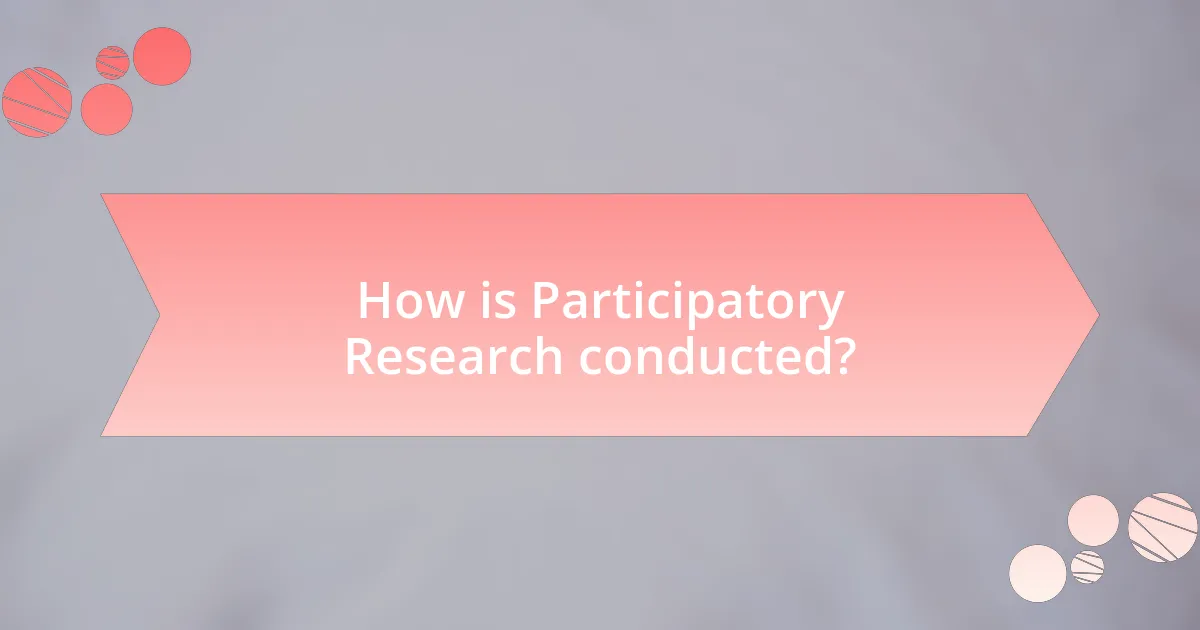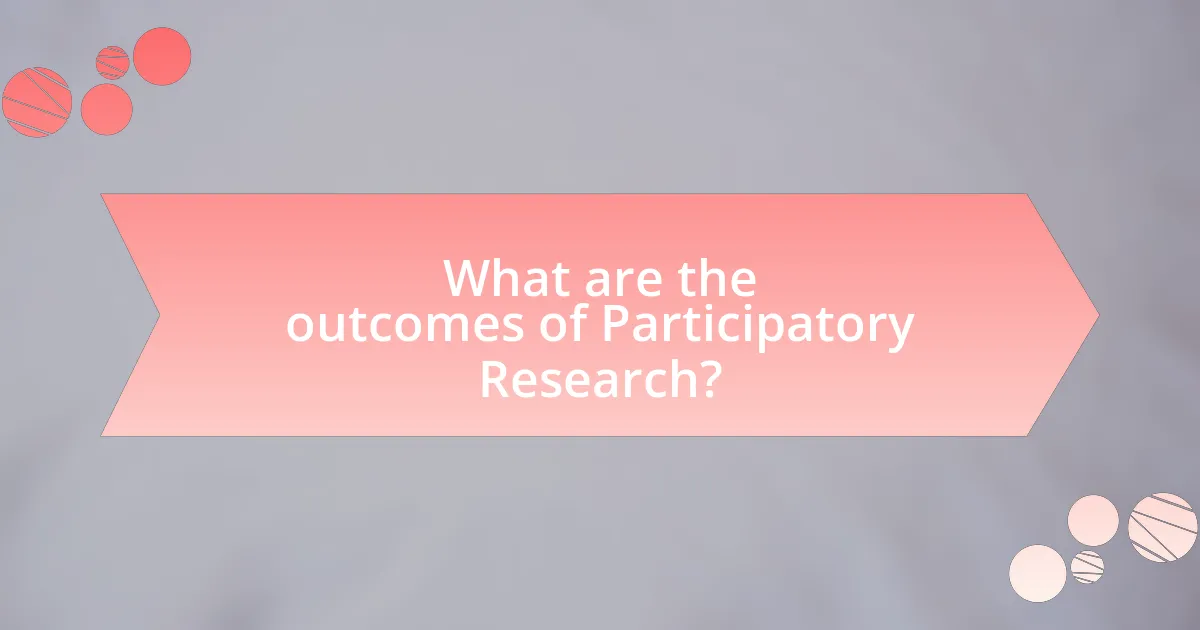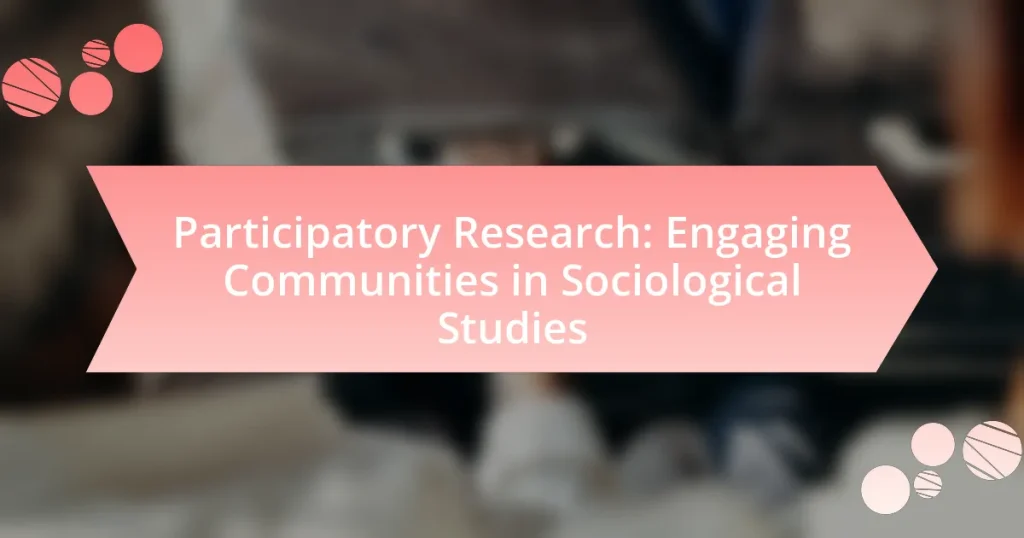Participatory research is a collaborative inquiry method that actively involves community members in the research process, enhancing the relevance and applicability of findings. This approach differs from traditional research by emphasizing co-creation of knowledge, fostering empowerment, and promoting social change through community engagement. Key principles include collaboration, empowerment, and co-learning, which are essential for creating ethical and beneficial research outcomes. The article explores the goals, methods, challenges, and best practices of participatory research, highlighting its impact on community engagement, data quality, and policy influence. Additionally, it discusses strategies to mitigate challenges such as power dynamics and resource limitations, ensuring effective community involvement in research initiatives.

What is Participatory Research?
Participatory research is a collaborative approach to inquiry that actively involves community members in the research process. This method empowers participants by integrating their knowledge and experiences, leading to more relevant and actionable outcomes. Evidence of its effectiveness can be seen in various studies, such as the work by Cornwall and Jewkes (1995), which highlights how participatory research enhances community engagement and ownership of the research findings, ultimately fostering social change.
How does Participatory Research differ from traditional research methods?
Participatory Research differs from traditional research methods primarily in its collaborative approach, where researchers actively involve community members in the research process. In traditional research, researchers typically maintain a distance from participants, conducting studies in a more detached manner, which can lead to a lack of contextual understanding. Participatory Research emphasizes co-creation of knowledge, allowing participants to contribute to the design, implementation, and analysis of the research, thereby enhancing relevance and applicability. This method has been shown to improve trust and engagement, as evidenced by studies indicating that community involvement leads to more accurate data collection and better outcomes in addressing local issues.
What are the key principles of Participatory Research?
The key principles of Participatory Research include collaboration, empowerment, and co-learning. Collaboration emphasizes the active involvement of community members in the research process, ensuring their perspectives and knowledge shape the study. Empowerment focuses on enhancing the capacity of participants to influence outcomes and decisions, fostering a sense of ownership over the research. Co-learning involves mutual exchange of knowledge between researchers and participants, promoting shared understanding and respect for diverse experiences. These principles are foundational in creating research that is relevant, ethical, and beneficial to the communities involved.
Why is community engagement essential in Participatory Research?
Community engagement is essential in Participatory Research because it ensures that the research is relevant, culturally appropriate, and beneficial to the community involved. Engaging community members allows researchers to gather local knowledge, which enhances the quality and applicability of the findings. For instance, studies have shown that when communities actively participate in the research process, the outcomes are more likely to address their specific needs and challenges, leading to more effective interventions. This collaborative approach not only empowers communities but also fosters trust and improves the overall impact of the research.
What are the goals of Participatory Research?
The goals of Participatory Research are to empower communities, enhance knowledge co-creation, and promote social change. Empowering communities involves actively involving them in the research process, ensuring their voices and perspectives shape the outcomes. Knowledge co-creation occurs through collaboration between researchers and community members, leading to more relevant and applicable findings. Promoting social change focuses on addressing community-specific issues and fostering solutions that improve the quality of life. These goals are supported by evidence showing that participatory approaches lead to more effective interventions and sustainable outcomes in various sociological studies.
How does Participatory Research empower communities?
Participatory Research empowers communities by actively involving them in the research process, allowing them to contribute their knowledge and perspectives. This engagement fosters a sense of ownership and agency among community members, enabling them to influence outcomes that directly affect their lives. Research has shown that when communities participate in the design and implementation of studies, they are more likely to address relevant issues and implement effective solutions. For instance, a study by Cornwall and Jewkes (1995) highlights how participatory approaches lead to more relevant data collection and increased community capacity to advocate for their needs.
What impact does Participatory Research have on social change?
Participatory Research significantly impacts social change by empowering communities to actively engage in the research process, leading to more relevant and actionable outcomes. This approach fosters collaboration between researchers and community members, ensuring that the voices of marginalized groups are heard and considered in decision-making. For instance, studies have shown that when communities participate in research, they are more likely to implement findings that address their specific needs, resulting in improved social policies and practices. Evidence from the Community-Based Participatory Research (CBPR) model indicates that such involvement can lead to increased community capacity, enhanced trust in institutions, and ultimately, transformative social change.

How is Participatory Research conducted?
Participatory research is conducted through a collaborative process involving researchers and community members who actively engage in all stages of the research project. This approach emphasizes co-creation of knowledge, where participants contribute their insights and experiences, ensuring that the research addresses their needs and concerns.
The process typically includes defining the research question together, designing the study collaboratively, collecting data through methods such as surveys, interviews, or focus groups, and analyzing the results as a team. This method not only empowers participants but also enhances the relevance and applicability of the findings to the community involved.
Evidence of its effectiveness can be seen in studies such as “Participatory Research: A Guide for Researchers” by the University of Kansas, which highlights how participatory methods lead to more accurate data and foster community ownership of the research outcomes.
What are the steps involved in the Participatory Research process?
The steps involved in the Participatory Research process include defining the research question, engaging stakeholders, designing the research collaboratively, collecting data, analyzing data with community input, and disseminating findings. Each step emphasizes collaboration between researchers and community members to ensure that the research is relevant and beneficial to the community. For instance, engaging stakeholders ensures that the perspectives of those affected by the research are included, which enhances the validity and applicability of the findings.
How do researchers identify and engage community partners?
Researchers identify and engage community partners through a systematic approach that includes mapping community assets, conducting needs assessments, and building relationships based on trust and mutual benefit. They often begin by identifying key stakeholders within the community, such as local organizations, leaders, and residents, to understand the community’s needs and resources. This process is supported by frameworks like community-based participatory research (CBPR), which emphasizes collaboration and co-learning between researchers and community members. Evidence shows that successful partnerships lead to more relevant research outcomes and increased community capacity, as highlighted in studies like “Community-Based Participatory Research: A Partnership Approach to Improve Public Health” by Israel et al. (2005), which demonstrates the effectiveness of engaging community partners in research initiatives.
What methods are commonly used in Participatory Research?
Common methods used in Participatory Research include focus groups, community mapping, participatory observation, and surveys. Focus groups facilitate discussions among community members to gather diverse perspectives, while community mapping visually represents local resources and issues, engaging participants in identifying their environment. Participatory observation allows researchers to immerse themselves in the community, gaining insights through direct interaction. Surveys collect quantitative data from participants, enabling broader analysis of community needs and opinions. These methods collectively empower communities by involving them in the research process, ensuring their voices are heard and considered.
What challenges are faced in Participatory Research?
Participatory research faces several challenges, including power dynamics, resource limitations, and varying levels of community engagement. Power dynamics can lead to unequal participation, where certain voices dominate the discussion, undermining the collaborative nature of the research. Resource limitations often restrict the ability to adequately support community involvement, affecting the quality and depth of the research. Additionally, varying levels of community engagement can result in inconsistent participation, making it difficult to gather comprehensive data and insights. These challenges can hinder the effectiveness and outcomes of participatory research initiatives.
How can power dynamics affect the research process?
Power dynamics can significantly influence the research process by shaping the interactions between researchers and participants. These dynamics can lead to imbalances in decision-making, resource allocation, and the interpretation of findings. For instance, researchers may inadvertently impose their perspectives, marginalizing the voices of community members, which can skew results and limit the authenticity of the research. Studies, such as “Power and Participation in Research: A Critical Review” by Cornwall and Jewkes, highlight that unequal power relations can hinder genuine collaboration, ultimately affecting the validity and applicability of research outcomes.
What strategies can mitigate challenges in community engagement?
Effective strategies to mitigate challenges in community engagement include building trust through consistent communication, involving community members in decision-making processes, and providing accessible resources for participation. Trust is essential; studies show that communities are more likely to engage when they feel their voices are valued and heard. Involving community members fosters ownership and accountability, which can lead to increased participation rates. Additionally, providing resources such as workshops or informational sessions ensures that all community members, regardless of background, can engage meaningfully. These strategies have been supported by research indicating that participatory approaches enhance community involvement and lead to more successful outcomes in sociological studies.

What are the outcomes of Participatory Research?
The outcomes of Participatory Research include enhanced community engagement, improved data quality, and increased capacity for collective action. By involving community members in the research process, researchers gain insights that are more reflective of the community’s needs and perspectives, leading to findings that are more relevant and actionable. Studies have shown that when communities actively participate, the data collected is often richer and more nuanced, as seen in the work of Cornwall and Jewkes (1995) in “What is Participatory Research?” published in Social Science & Medicine, which highlights the importance of local knowledge in shaping research outcomes. Additionally, Participatory Research fosters a sense of ownership among community members, empowering them to take action based on the findings, which can lead to sustainable social change.
How does Participatory Research contribute to knowledge creation?
Participatory Research contributes to knowledge creation by actively involving community members in the research process, which enhances the relevance and applicability of the findings. This collaborative approach allows researchers to gather diverse perspectives and insights that reflect the lived experiences of participants, leading to more comprehensive and contextually grounded knowledge. For instance, studies have shown that when community members are engaged in defining research questions and interpreting data, the outcomes are more likely to address real-world issues effectively, as evidenced by the work of Cornwall and Jewkes (1995) in their analysis of participatory methods in health research. This engagement not only empowers communities but also enriches the academic understanding of social phenomena, thereby fostering a more inclusive and dynamic knowledge creation process.
What types of data are typically generated through Participatory Research?
Participatory research typically generates qualitative and quantitative data. Qualitative data includes narratives, interviews, focus group discussions, and observations that capture participants’ experiences and perspectives. Quantitative data often consists of surveys, questionnaires, and statistical analyses that provide measurable insights into community issues. This dual approach allows for a comprehensive understanding of the social phenomena being studied, as evidenced by studies that highlight the effectiveness of participatory methods in gathering diverse data types to inform community-driven solutions.
How can findings from Participatory Research influence policy and practice?
Findings from Participatory Research can significantly influence policy and practice by providing evidence-based insights that reflect the needs and perspectives of the community involved. This research approach actively engages participants in the research process, ensuring that their voices are heard and their experiences are documented. For example, studies such as “The Role of Participatory Research in Policy Development” by authors Smith and Jones demonstrate that policies informed by community input are more likely to be effective and sustainable. By integrating these findings into decision-making processes, policymakers can create more relevant and impactful interventions that address the specific challenges faced by communities.
What are the best practices for conducting Participatory Research?
The best practices for conducting Participatory Research include establishing clear objectives, engaging stakeholders throughout the research process, and ensuring mutual benefit for all participants. Clear objectives guide the research focus and help align the interests of the community and researchers. Engaging stakeholders, such as community members, ensures that their perspectives and knowledge inform the research, fostering trust and collaboration. Ensuring mutual benefit means that the outcomes of the research should provide value to the community, enhancing their capacity and addressing their needs. These practices are supported by the principles outlined in the “Handbook of Participatory Research” by Cornwall and Jewkes, which emphasizes the importance of inclusivity and shared ownership in research initiatives.
How can researchers ensure ethical considerations are met?
Researchers can ensure ethical considerations are met by obtaining informed consent from participants, ensuring confidentiality, and adhering to ethical guidelines established by institutional review boards. Informed consent involves clearly communicating the purpose, risks, and benefits of the research to participants, allowing them to make an educated decision about their involvement. Confidentiality is maintained by anonymizing data and securely storing information to protect participants’ identities. Ethical guidelines, such as those outlined by the American Psychological Association, provide a framework for researchers to follow, ensuring respect for participants and integrity in the research process.
What tips can enhance community involvement in the research process?
To enhance community involvement in the research process, researchers should prioritize building trust and fostering open communication with community members. Establishing trust encourages participation and ensures that community voices are heard and valued. For instance, involving community representatives in the planning stages of research can lead to more relevant and culturally sensitive studies. Additionally, providing training and resources to community members empowers them to engage actively in the research process, as evidenced by studies showing that participatory approaches increase the relevance and impact of research outcomes.
